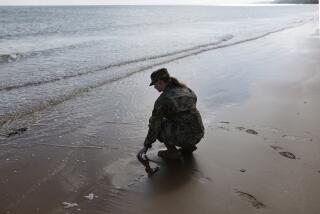DIPLOMACY : Japan’s Refusal to Apologize to POWs Stirs Old Animosity
- Share via
LONDON — Many Americans still remember the harrowing ordeal of U.S. soldiers captured by the Japanese early in World War II--the grueling Bataan Death March in the Philippines, the execution of Army pilots in Japan.
But the British and Commonwealth Allies had more prisoners of war taken by the Japanese, who were equally cruel to soldiers who surrendered in Singapore, Hong Kong and other Far East outposts.
British prisoners, in particular, were pressed into work gangs to build a railroad in Thailand, depicted in the film “The Bridge on the River Kwai,” and suffered atrocities at the hands of vicious Japanese warders.
Now, with the approach of the 50th anniversary of the victory over Japan next month, many British veterans groups are protesting the lack of any public apology from the Japanese government--and demanding an expression of remorse.
As recently as last month’s Group of Seven summit in Halifax, Canada, Prime Minister John Major and then-Foreign Secretary Douglas Hurd made representations to Japanese leaders seeking some kind of formal government apology.
So far, to no avail.
As a result, the veterans organizations are threatening to boycott any V-J Day celebration that emphasizes a “reconciliation” theme.
The reconciliation motif was to be the centerpiece of a prayer service at Buckingham Palace next month led by the Anglican Archbishop of Canterbury, George Carey, and the Ro-
man Catholic Archbishop of Westminster, Cardinal Basil Hume.
But ex-POW groups, backed by a vociferous campaign by British newspapers, argue that the concept of reconciliation is inappropriate given Japan’s persistent refusal to apologize for wartime atrocities as have the Germans, their onetime allies.
Viscount Slim, a veteran of the Far East campaign and president of the Burma Star Assn. veterans group, said: “Our sadness is quite simple--that the government of our former enemy have not informed their own new and younger generation exactly what happened, not just to soldiers and civilians of Britain and the Commonwealth, but also the way they treated the inhabitants of the countries they conquered.”
While POW figures vary, Harold Payne, president of the National Federation of Far East Prisoners of War Assns., says there were about 50,000 Britons held prisoner, as well as 23,500 Australians, New Zealanders and Canadians--and about 21,500 Americans.
Of that total, Payne’s figures show, about 28.6% died in captivity. This compares with only 4% of POWs who died while being held by Germany.
In an added POW controversy, the veterans groups object to the twin “reconciliation” statues commissioned by Richard Branson, head of Virgin Atlantic Airways, and scheduled to be installed in the ruins of the blitzed cathedral in Coventry, England, and in the Peace Garden in Hiroshima, Japan.
Alf Hunt, secretary of a veterans group, said: “I cannot see any reconciliation without getting an apology from the Japanese. I’m afraid it will take more than a statue to make ex-POWs forget the atrocities.”
More to Read
Sign up for Essential California
The most important California stories and recommendations in your inbox every morning.
You may occasionally receive promotional content from the Los Angeles Times.










